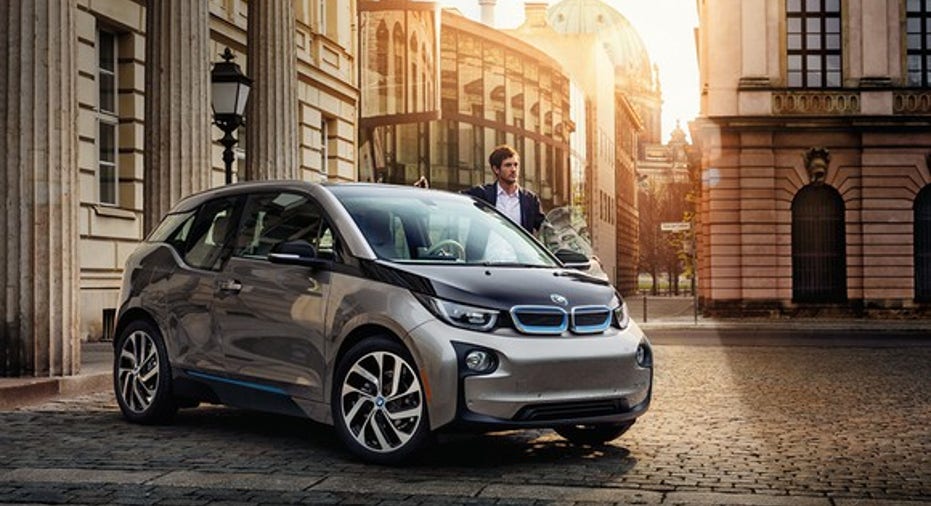Better Buy: Tesla vs. BMW

In the high-end performance segment of the auto industry, Tesla(NASDAQ: TSLA) and BMW (NASDAQOTH: BAMXF) are two of the best brands and most innovative manufacturers in the world. BMW has long been an aspirational brand focused on high performance with a level of luxury that consumers demand when spending upward of $100,000 on a vehicle. Tesla is breaking all of the rules of the auto industry and is growing its fleet of electric vehicles.
But investors have to balance growth with performance and value in a stock. And with BMW and Tesla, those factors collide amid a passionate debate about the future of the auto industry.
The electric BMW i3. Image source: BMW.
The known commodity
BMW is the better-known company of these two, having sold 2.37 million vehicles in 2016 and generated 6.9 billion euros in net income for the year. Its EBIT (earnings before interest and taxes) margin of 8.9% is among the industry's best, and management has guided for 8% to 10% EBIT margin through 2020.
What BMW brings from a manufacturing and quality standpoint is extremely valuable, even though those are less tangible factors than financial results.The company has decades of manufacturing expertise and has been able to generate strong margins while staying at the forefront of new technologies like carbon fiber, autonomous driving, and electric vehicles (EVs). It's even launched a ride-sharing product in Seattle, with Portland (Oregon) and Brooklyn expected to follow.
The advantage investors have with BMW is knowing that it can execute on its automotive manufacturing plans and having confidence in its ability to follow industry trends where they're headed. With EVs clearly growing as a percentage of auto sales around the world, BMW can learn and adapt to where the market is going. But it'll be able to follow upstarts like Tesla as they grow the market rather than being on the bleeding edge of a new industry.
Tesla's Model S with the first Powerwall. Image source: Tesla.
The upstart with a lot of unknowns ahead
Tesla has gotten the most attention of any EV company, and for good reason. It's pushing the envelope, and its EV-only business model seems to be the most effective way to build a viable EV brand. And with energy storage and solar power under its wing, the company has broad and diverse exposure to renewable energy.
All of that growth comes at a cost, though, with Tesla spending $1.28 billion on capital expenditures in 2016. Goldman Sachs recently predicted that 2017 capital expenditures would be $3 billion to build out capacity to build the Model 3 and ramp up to capacity for 500,000 vehicles in 2018. Plus, the company needs to fund raw materials for building out the Model 3.
The allure of growth is intoxicating, but it comes at high risk as well. Analysts already expectTesla will need to raise capital in coming months to fund its growth plans. And the company certainly needs to improve quality and its parts supply chain just to match competitors (for evidence of this, read fellow Fool Evan Niu's saga abouttrying to get his Model S repaired). Improving manufacturing quality and building out an international parts supply chain is no small task, and it's something Tesla has never done, so it's an unknown for the company and leaves a lot of uncertainty for investors.
Tesla's products are well liked by earlyadopters, but still haven't been tested by the masses. While BMW sold over 2 million vehicles last year, Tesla has only sold about one-tenth that figure in its nearly 14-year history. Translating hype to operational success could prove harder than Tesla can handle.
Why it's hard to pay up for potential in the auto industry
Given the unknowns facing Tesla, it's hard to justify paying 10 times the price-to-sales ratio investors are getting with BMW. And keep in mind that Tesla would have had to increase deliveries by 31 times just to match BMW in 2016.
BAMXF Market Cap data by YCharts.
Maybe the more fundamental question is whether or not the auto industry, and big players like BMW, will be able to adapt to Tesla if the latter's success continues. And I'll point out that progress in the auto industry is extremely slow. Tesla seems like an upstart, but it's nearly 14 years old and is still making fewer than 100,000 vehicles per year. That's not much of a track record, no matter how good the company's brand is, and I think automakers will quickly be able to catch Tesla in the EV market.
The fact that investors have to pay a massive premium to own Tesla's shares is the main reason I think BMW is the better stock to own today. There's more stability, a longer track record, and we know BMW can be a world-class manufacturer -- something Tesla still hasn't proven to investors.
10 stocks we like better than BMWWhen investing geniuses David and Tom Gardner have a stock tip, it can pay to listen. After all, the newsletter they have run for over a decade, Motley Fool Stock Advisor, has tripled the market.*
David and Tom just revealed what they believe are the 10 best stocks for investors to buy right now... and BMW wasn't one of them! That's right -- they think these 10 stocks are even better buys.
Click here to learn about these picks!
*Stock Advisor returns as of February 6, 2017
Travis Hoium has no position in any stocks mentioned. The Motley Fool owns shares of and recommends Tesla. The Motley Fool recommends BMW. The Motley Fool has a disclosure policy.



















